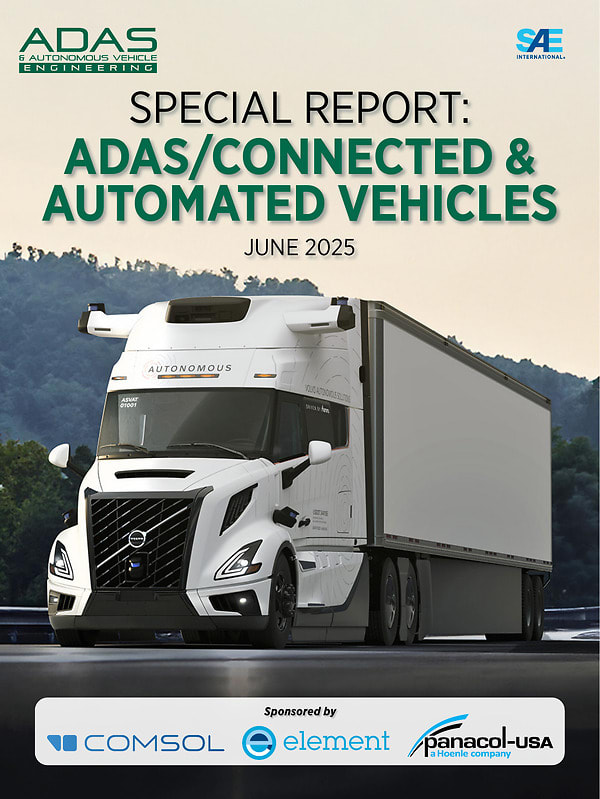ADAS/Connected & Automated Vehicles - June 2025

Autonomous trucking tech hits high gear…How Deere is advancing off‐highway autonomy…four keys to success for software‐defined vehicles (SDVs). Read about these developments and more in this compendium of articles from the editors of Automotive Engineering and Truck & Off‐Highway Engineering.
Don't have an account?
Overview
The June 2025 Special Report on ADAS, Connected, and Automated Vehicles delves into the transformative shift in the automotive industry towards software-defined vehicles (SDVs). This evolution is characterized by the increasing integration of software into vehicle design and functionality, making cars as adaptable and personalized as smartphones. Projections indicate that SDVs could constitute up to 90% of vehicle production by 2029, a significant increase from just 3.4% in 2021.
The report outlines the driving forces behind this shift, including advancements in electrification, connectivity, and autonomous driving technologies, as well as innovative ownership models. However, the transition to SDVs is fraught with challenges. Manufacturers like GM, Volkswagen, and Volvo have encountered significant roadblocks in their efforts to adapt to this new paradigm, highlighting the complexities of integrating sophisticated software with traditional vehicle hardware.
One of the major concerns is the rise in software-related recalls, which affected nearly 10 million vehicles in 2022, a stark increase from 600,000 in 2012. These recalls not only incur substantial costs but also pose risks to manufacturers' reputations, as seen in Ford's experience with penalties exceeding $165 million due to quality assurance failures. The report emphasizes the importance of robust verification and validation processes to ensure the seamless integration of various components, such as infotainment systems and autonomous driving features, sourced from multiple suppliers.
To mitigate risks and enhance quality management, the report suggests that manufacturers adopt outcome-based engagements with vendors, holding them accountable for delivering high-quality results. This approach aligns vendor performance with manufacturers' goals and helps maintain production standards across SDV lines. The report also advocates for treating software development as an enterprise-scale operation, akin to a supply chain, and recommends establishing software factories and leveraging specialized vendors to ensure scalable and secure software solutions.
Artificial intelligence (AI) is highlighted as a crucial tool for accelerating the success of SDVs. AI-powered tools can streamline the engineering process, enabling manufacturers to manage the complexities of constant software updates and integrations more efficiently. The report encourages manufacturers to focus on core competencies while partnering with external experts for non-core tasks, such as maintaining older vehicle generations. This strategic division of labor allows manufacturers to concentrate on critical areas like design and engineering while ensuring that validation and lifecycle management are handled effectively.
In summary, the report underscores the automotive industry's rapid transition to SDVs, driven by technological advancements and changing consumer expectations. While the journey presents significant challenges, manufacturers have a unique opportunity to innovate and lead in this competitive landscape by adopting rigorous quality management practices, leveraging AI, and strategically managing their development processes. The future of vehicles promises to be smarter, safer, and more personalized, setting the stage for a new era in automotive technology.

